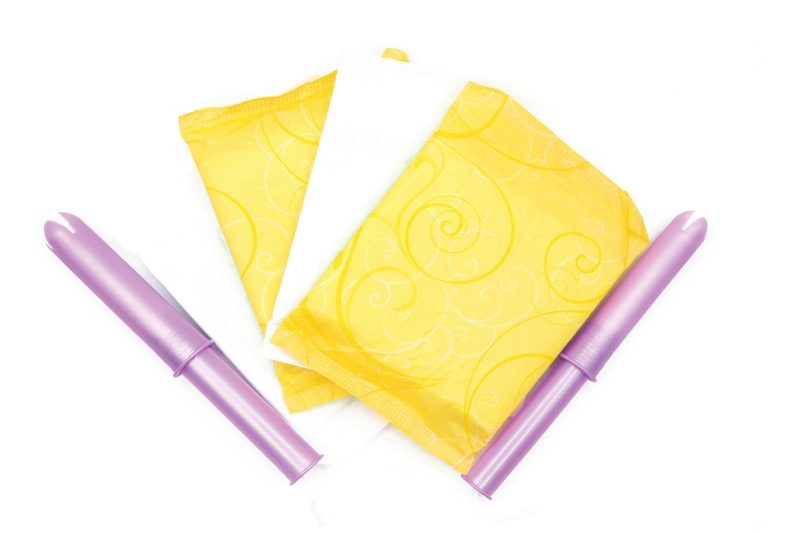A deeper look at the findings of the study, which was conducted by national sustainability marketing firm Shelton Group, reveals that 17% of women have already switched. Those currently using non-disposable period products are likely to be between 25 and 34 years old, and concerned about the environment. Another 23% of women are considering making the switch to nondisposable, reusable products. These women are mostly between the ages of 18 and 24.
Katie Wells, CTNC, MCHC, founder and CEO of Wellness Mama, summed up the concerns many women have on her site: “Health ramifications aside, options like pads and tampons aren’t good for the planet. Each woman will use an estimated 16,000 pads or tampons in her lifetime. These products end up in landfills, taking years and years to break down.” In fact, she reports, more than 12 billion sanitary pads and 7 billion tampons are dumped into landfills each year (2).
Giving women more reasons to consider making the switch, Dr. Joseph Mercola outlines the health concerns of traditional option in an article titled, “Diapers, Menstrual Pads and Tampons Are Full of Toxic Chemicals.” He explains that tampons can serve as a direct route to the bloodstream for contaminants—and with some mainstream brands harboring dioxins, furans and pesticide residue, that’s worrisome. He also notes that most cotton fibers used are genetically engineered (GE). “While the risks are unknown,” Dr. Mercola cautions, “inserting GE cotton into your vagina many times each month is likely no different from ingesting GMO food” (3). The advice Dr. Mercola gives women: “Switching to organic cotton protection for your menstrual periods...reduces your exposure to ubiquitous chemicals known to accumulate in your body and trigger dangerous health conditions.” On that front, there are several organic options for both tampons and pads—brands like Natracare and Maxim offer organic and natural tampons, pads and liners (plus options for incontinence, too). The industry is also continuing to innovate and offering a wider selection of natural, organic and reusable options. A look at what’s trending:
Washable Pads Before commercially made disposable pads and tampons were available, women made their own reusables (4), and manufacturers are taking it back to those times. Instead of plastic-backed, bleached out disposables, women can opt for cloth reusable pads with colorful designs. Cloth reusable pads are designed to last years. They are offered in several sizes and typically consist of inserts that are placed in a holder, which snaps onto underwear.
Period Panties When it comes to period underwear, there are several options. Some are designed to help pads stay in place; others act as a pad itself and others work to absorb blood and ward off leaks. Health-conscious consumers will be interested in versions made with organic cotton—brands like Luna Undies, Sustain Natural and Thinx offer organic period underwear that can be washed and reworn.
Cups Menstrual cups are gaining in popularity—the global menstrual cup market garnered $1.21 billion in 2018, and is estimated to reach $1.89 billion by 2026, growing at a CAGR of 5.7% (5). If properly cleaned and cared for, menstrual cups can last up to 10 years, which equates to saving hundreds of dollars, as well as avoiding those potential toxins in conventional tampons and cutting waste. The Diva Cup is perhaps the most well-known option, but it’s not the only one. GladRags offers menstrual cups, and a writer’s review on www.organicauthority.com listed Peachlife Menstrual Cup and Sustain Natural as favorites (6).
Reusable Tampon Applicators Much of the environmental impact from popular menstrual products has come from their disposable nature—but as noted, that’s starting to change. For the eco-conscious consumer who prefers tampons, a reusable tampon applicator, like from Thinx, may be a great choice. Combined with a choice of organic cotton tampons, reusable tampon applicators last for years and replace the constant waste of single-use plastics. WF
Transparency Coming to Menstrual Products
This summer, a bill passed in the New York State Senate and Assembly that would require labeling on menstrual products. The bill was introduced by New York Assembly member Linda Rosenthal and sponsored by state Senator Roxanne Persaud. “I know what’s in my toothpaste and my shampoo, I should know what’s in my tampons,” said Assembly member Linda B. Rosenthal in a statement. “Menstruators have a right to know the ingredients in products that they put in and on some of the most sensitive parts of their bodies 24 hours a day, for seven to 10 days a month every month for as many as 40 years. For years, menstruators have been stigmatized, their periods shrouded by shame. This legislation helps to smash the stigma surrounding menstruation and helps empower menstruators to make educated decisions about the products they use on their most sensitive body parts” (7). References- Shelton Group, “A Period of Change: A market disruption and what we can learn from it” Accessed 8/30/19. www.sheltongrp.com/work/shelton-pulse-special-report-a-period-of-change
- www.wellnessmama.com/4668/menstrual-cup/
- Dr. Joseph Mercola, “Diapers, Menstrual Pads and Tampons Are Full of Toxic Chemicals” February 13, 2019, Accessed 8/21/19, https://articles.mercola.com/sites/articles/archive/2019/02/13/absorbent-hygiene-products-health-risks.aspx
- Elizabeth Peberdy, Aled Jones *OrcID and Dannielle Green, “A Study into Public Awareness of the Environmental Impact of Menstrual Products and Product Choice” Global Sustainability Institute, Anglia Ruskin University, East Road, Cambridge CB2 1PT, UK, 30 November 2018 / Accepted: 12 January 2019 / Published: 17 January 2019
- “Menstrual Cup Market by Product Type (Disposable and Reusable), Material (Medical Grade Silicone, Natural Rubber, and Thermoplastic Elastomer), and Distribution Channel (Online Stores and Pharmacies & Retail Stores): Global Opportunity Analysis and Industry Forecast, 2019–2026,” www.alliedmarketresearch.com, 7/19. Accessed 8/19. www.prnewswire.com/news-releases/menstrual-cup-market-to-reach-1-89-bn-globally-by-2026-at-5-7-cagr-allied-market-research-300893954.html.
- www.organicauthority.com/energetic-health/3-tried-and-tested-menstrual-cups-for-every-woman
- https://nyassembly.gov/mem/Linda-B-Rosenthal/story/87707










